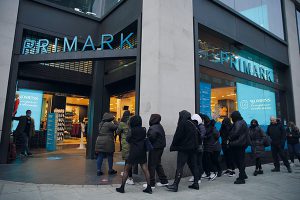It’s the end of an era for Primark’s owner Associated British Foods Plc, as longtime CFO John Bason prepares to retire in April next year. He will be succeeded by Eoin Tonge, the finance director of Marks & Spencer Group Plc.
Behind the drama — Tonge was given an enlarged role at M&S only a few weeks ago and was part of the triumvirate of top managers tasked with running M&S after the departure of Chief Executive Officer Steve Rowe — was an equally important announcement. After stepping down, Bason will chair a new strategic advisory board at Primark.
The move means Primark continues to retain Bason’s expertise — he has been at the group for 23 years and will be a senior adviser to the business. But it will be the first time there is any explicit input into the clothing retailer from outside of the ABF stable.
The company said that the new board would not have any governance role and Primark’s financial and operational reporting relationship would be unchanged. Instead, the team will advise Primark management, led by CEO Paul Marchant, on the US market, digital developments and sustainability, for example the science around reusing fabrics. It will likely meet three to four times a year, but will be on hand between those gatherings to offer support.
The move is significant. As Primark expands across the US, the case for splitting Primark from ABF’s food businesses grows stronger. ABF should use this first step as a springboard to explore a separation.
Primark will already account for almost 50% of ABF’s revenue in the year to September 2022, according to the Bloomberg consensus of analysts’ estimates. The retailer is also expected to generate about 55% of ABF’s operating profit. The remainder is made up of sales and profits from ABF’s grocery, sugar, agriculture and ingredients businesses.
And Primark is continuing to expand — in Europe and, importantly, the US. It plans to increase its American store footprint from 13 currently to 60 within five years. The US business could generate about $1 billion of sales and at least $100 million of profit by 2026, according to analysts at Barclays Plc.
—Bloomberg
 The Gulf Time Newspaper One of the finest business newspapers in the UAE brought to you by our professional writers and editors.
The Gulf Time Newspaper One of the finest business newspapers in the UAE brought to you by our professional writers and editors.
